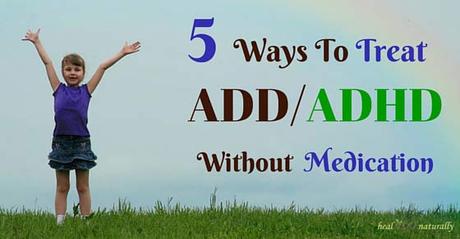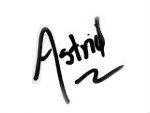
Your child has ADHD, the dreaded news no parent wants to hear.
You are in shock and have no idea what to do next, but your pediatricianimmediately urges you to put your child on Ritalin or some other medication to "treat the symptoms".
So you are torn...What do I do?
I don't want my child to get worse, but at the same time, I don't want to pump synthetic medications in his/her little body.
You need to know that your child's conditions is definitely not a deficiency in Adderall, Ritalin or any other stimulants. Today in America 1 in 10 children is on stimulants.
The good news? You don't need to take that route.
There are many alternative treatments, neurofeedback, and lifestyle changes proven to treat and even reverse ADD/ADHD naturally.
What is ADHD/ADD
Attention Deficit Disorder (ADD) is a common neurological disorder affecting more and more children today. Attention deficit/hyperactivity disorder (ADHD) affects adults and especially children who experience lack of concentration, over activity and impulsivity.
ADD is basically a brain disorder that affects one's life. If not properly treated, ADD can hamper one's self-esteem, academic achievement, personal and professional relationships. Statistics reveal:
- In a classroom of 30 students, about 1-3 suffer from ADD
- About 50% of the children suffering from ADHD have sleep problems
- Compared to girls, boys are three times more at the risk of developing ADD
- About 75% of boys and 60% of girls suffering from ADD/ADHD experience hyperactivity
What Causes ADD-ADHD?
ADHD can be the result of a number of factors that affect the way your brain functions. Though the main cause for ADD/ADHD is still not clear, a June 2009 research report published in the Molecular Psychiatry online publication links the disorder to genetics. The report found that children affected with ADHD are more likely to experience genetic variations than those without ADHD.
Other factors that can cause ADD/ADHD include b rain injuries, hormonal changes, nutritional deficiencies, sugar, food additives, and environmental factors.
ADD/ADHD Symptoms
- Children affected with ADHD are often found to be restless, impulsive and experience lack of concentration. A child affected with ADD/ADHD experiences these symptoms for more than a period of six months. In fact, these symptoms are more severe than those experienced by other children of the same age group.
- Children who are inattentive show various symptoms. They experience difficulty in concentration. Often these children are unable to complete their homework assignments and forget to keep their stationery, toys in place.
- They tend to become easily bored with a particular job within a few minutes or are often easily distracted, tend to forget things, and cannot stick to one activity for a long time. These children are very inattentive and do not pay attention to others.
- Children who show signs of hyperactivity tend to twist and turn in their seats. They talk nonstop and experience difficulty being still at one place. They are always on the move and are not able to do anything quietly.
- Children who are impulsive are very impatient and can't wait for something they want. Such kids have no self-control over their emotions and tend to disturb others by crying out or shouting inappropriate comments.

Treatments & Strategies To Address ADD/ADHD Naturally
There are numerous medications available to treat ADD/ADHD. However, not only are they unsafe especially for children, but these fail to have a long lasting impact- worse yet they do not work.
According to Dr. Mark Hyman the Founder and medical director of The UltraWellness Center, chairman of the board of the Institute for Functional Medicine this is why ADHD medications do not work:
Today, the list of medications and untested cocktails and combinations has grown to frightening proportions. Children with mental, behavioral, or emotional problems get antipsychotic medications, like Risperdal; anti-seizure medications, like Trileptal; and antidepressants, like Prozac; all on top of stimulant medications, like Ritalin, Concerta, and Adderall. This is quite a drug cocktail for any child, yet they still don't experience much relief from physical, mental, or behavioral symptoms.
Unfortunately, this is how we approach things in medicine: Divide it all up into parts, farm them out, and pile on the pills. What a life for both the patient and his/her family!
While some severe cases of ADD do require medications, for most kids some simple dietary and lifestyle changes can make enormous differences that have a profound impact to cure ADHD without medications.
Contrarily, natural treatments often prove to work in combination with processed foods, sugar, gluten and dairy free foods, and life style changes. Moreover, alternative therapies have no side effects, and are thus considered safer.
1. Eat a Whole Foods Diet (Organic if possible)
There is clear evidence that addressing the problems associated with foods, allergens and environmental toxins linked to ADD/ADHD is key in the success of its treatment without medications. Eat wholesome foods-preferably organic- fresh fruits and vegetables to avoid pesticides and herbicides. Pastured local meats and wild caught fish, healthy fats (avocado, coconut oil (this is what I use) and olive oil).
On the other hand avoid culprits starting immediately or if financially impossible by doing a process of elimination as follows:
- Sugar
- Processed foods
- Adderall
- ADHD Drugs
- Casein
- Methylphenidate
- Organophosphate Pesticides
- Pesticides
- Bisphenol A
- Parabens
- Aspartame
- Brilliant Blue FCF
- L-glutamic Acid
- Quinoline Yellow
Additionally, there is further evidence that the American Standard Diet (ASD) or western diet and all vaccinations have are highly linked to ADD/ADHD. [1]
2. Food Sensitivities
Testing your child for food sensitivities is the best way to find out. However, it is well known today that dairy and gluten are two of the most common allergens in children and adults alike. Partially digested dairy and wheat particles (called caseomorphins and gliadomorphins) are found in the urine of severely depressed patients (as well as children with autism and ADHD). I recommend a complete 100 percent elimination of all gluten and dairy foods for a full six weeks- says Dr Mark Hyman in his article 7 Strategies to Address ADHD. [2]
Therefore avoid the following allergens:
- Food Dyes (candy, pastries. some children's vitamins)
- gluten (this article demonstrates that children with ADHD can have an adverse reaction to gluten)
- Grains
- Conventional Dairy (from cows raised in CAFO's)
3. Nutritional Deficiencies
Research demonstrates that diet and life style changes have a considerable impact in effectively addressing ADD/ADHD. The following substances are beneficial in treating ADD/ADHD naturally based on their cumulative value.
Adults and children with untreated ADD/ADHD craved junk food. Their diets are usually full of food additives, preservatives, dyes, gluten, sugar (usually found in high carb foods) all associated with ADHD.
Blood work is one of the best ways to confirm a lack of several important nutrient such as:
[list icon="icon: leaf" icon_color="#a0ac31″]
- Omega-3 Fatty Acids, DHA (Docosahexaenoic Acid), EPA (Eicosapentaenoic Acid) ~ Essential for optimal brain function. In fact, 60 percent of the brain consists of DHA. A lack of these fats is strongly associated with ADHD , as well as eczema and immune deficiency. [2]
- Essential Fatty Acids
- Pine Bark Extract
- Vitamin D
~ Low levels of vitamin D are linked to lower immunity (This is what I use and always recommend)
- Chamomile~ Excellent to calm and relax nerves naturally.
- Flaxseed
- Gamma-Linoleic Acid (GLA)
- Iron
- Low Vitamin A and Omega 3's~ Low vitamin A and omega-3 fat deficiency can display "bumps" on the back of the arms.
- Magnesium~ Several studies have linked low magnesium with depression and behavior issues (Buyt it here).
- Omega-6 Fatty Acids
- Vitamin C ~ Buy optimal liposomal Vitamin C
- Tryptophan~ is an amino acid (building block of protein) needed to make serotonin, the chemical in the brain for a relaxed and happy mood, and melatonin, the chemical for sleep [2]
- Vitamin B6~ Crucial to converting tryptophan into serotonin. Some medications actually deplete patients of B6 (Buy it here)
- Cannabis Oil but if you have no access to it get Hemp oil~ (Buy it here)
- Delta-tetrahydrocannabinol (THC)
- Acetyl-l-carnitine
Read the full research paper on ADHD.
4. Neurofeedback
NFB is training in brain function, based on information gathered from the EEG (Electroencephalogram) that tests the electrical activity of the brain.
According to the Hull Institute NFB has been around since the 1960's but it has not yet gained huge traction as a mainstream intervention, probably because the pharmaceutical industry holds the market on medication.
There is a growing body of research showing neurofeedback efficacy in treating these disorders. In fact, The American Academy of Pediatrics has determined that NFB is a level two evidenced based practice in the treatment of ADHD. Neurofeedback also stabilizes the brain to reduce anxiety and depression, allowing for better, more lasting recovery from eating disorders and/or other addictions. ( source).
Find a Neurofeedback therapy clinician here.5. Heal The Gut
We now know that healthy gut bacteria is crucial not only for gastrointestinal health but most importantly for- brain and auto-immune health.
Dr. Perlmutter a leading integrative medicine neurologist, founder and president of Bastyr University and best seller of Grain Brain
Apart from the fact that being born by cesarean section dramatically increases the risk for ADHD, as does frequent antibiotic exposure (both of which affect gut bacteria), a high percentage of children with ADHD have straightforward bowel abnormalities in comparison to age-matched controls.
evaluated 742,939 children and demonstrated that those children with ADHD had a dramatic increased prevalence of constipation almost threefold higher than those without ADHD. Fecal incontinence was sixfold higher in the ADHD group, and visits to the doctor because of bowel issues was also dramatically increased in kids with ADHD. Importantly, these findings did not differ depending on whether or not the children with ADHD were on medication.
How do your health the gut? Consume anti-inflammatory foods introduce natural probiotics to your diet if you already haven't. Consume plenty of wild-caught fish ( I get mine from here) or if you want a cheaper and easy to consume version (like for those busy days) I love Wild Planet canned salmon. Also, plant-based oils such as flaxseed, and avocado (I love this one).
In Conclusion
Conventional brain-altering medications have proven to be a failure in treating ADD/ADHD because they do not address the root cause. Consider following the steps above hand in hand with a functional medicine physician or if your any conventional doctor who is is willing to work with you to find and reverse ADHD not merely masking the symptoms.
Remember your child is unique, and so will his/her treatment. However, as you can see there are many ways to address ADHD with alternative treatments.
[box title="Note:" style="noise" box_color="#f1f1f1″ title_color="#2d5d20″ radius="12″] It can be difficult to get off medications, and sometimes that can come with certain risks. Remember to always do this under a physician's supervision. It is not recommended for anyone stop using their medications suddenly. Mark Hyman~ [/box]
How about You?
Was your child or someone close to you diagnosed with ADD/ADHD? Did you take the conventional approach with medications? Did you try alternative therapies and how is that working for you? Share with us!
Additional resources you may find helpful about ADD/ADHD
Associations between Acetaminophen Use during Pregnancy and ADHD Symptoms Measured at Ages 7 and 11 Years.
EPA/DHA improve plasma phospholipids and behavior in children with ADHD. - GreenMedInfo Summary
Thanks for reading, and sharing my posts! If you found this post helpful I'd meant a lot to me if you shared it with others.
To your best health,

 References
ReferencesImage source
http://www.myadhd.com/causesofadhd.html http://www.nimh.nih.gov/health/publications/attention-deficit-hyperactivity-disorder/complete-index.shtml http://www.umm.edu/patiented/articles/some_alternative_approaches_attention-deficit_hyperactivity_disorder_000030_10.htm http://drhyman.com/blog/2015/10/21/7-strategies-adhd/ [2] http://articles.mercola.com/sites/articles/archive/2011/11/02/gluten-contribute-to-adhd.aspx http://www.hullinstitute.com/Neurofeedback.aspx http://www.drperlmutter.com/gut-implications-adhd/?hvid=6zeAyn
http://www.greenmedinfo.com/disease/attention-deficit-disorder-hyperactivity [1]
Did You Enjoy This Post?
If you learned something, please share and leave a comment below




